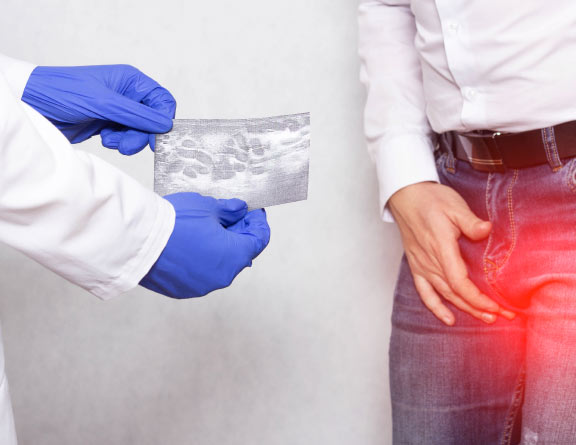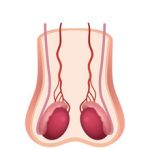Advanced painless surgery for permanent treatment of varicocele
Surgicare is a multi-speciality healthcare provider which aims to deliver a hasasle-free surgical experience to all patients by leveraging technology, and a set of advanced operations and powerful processes.
Book Free Appointments With Our Expert Doctors
- Get free consultation for 50+ diseases
- In-person and online consultation with experienced doctors
- Extensive medical assistance throughout your treatment

According to the NABH Norms
No Cuts, No Wounds, Painless*
Insurance Paperwork Support
Web-View
Technology
What is a Varicocele?
Varicocele is a very common condition in adult males, affecting nearly 15 percent of them. In the condition of varicoceles, the veins in the scrotum become visibly enlarged or twisted. This happens due to damaged vein valves. The damaged valves do not function properly, resulting in a reflux of blood. The blood then starts to pool in the veins, thereby making them swollen and enlarged. Varicoceles quite often lead to infertility issues and thus require to be treated in time.
Book Your Appointment
Overview of Varicocele
→ Anemia
→ Fecal Incontinence
→ Blood Clots
→ Infection of tissues
→ Strangulation/gangrene (In severe cases)
→ Abscess formation (In severe cases)
→ Tissue death (In severe cases)
→ No cuts, no stitches, no scars
→ 30-min procedure
→ 1-day discharge
→ Most effective treatment
→ Relief from pain while sitting
→ Relief from bleeding in stool
→ Reduces chances of anal cancer
→ Cures Inflammation in the anal region
→ 30% off on diagnostic tests
→ Confidential consultation
→ Single deluxe room
→ Free follow-ups post-surgery
→ 100% insurance claim
→ All Insurances covered
→ No upfront payment
→ No running behind insurance authorities
→ Paperwork by Surgicare team on your behalf
Causes of Varicocele

Injury

Drinking water while standing

Infection like epididymitis

Exercising without any protective gear

Blockage in the spermatic cord
Symptoms of Varicocele

Lump like formation in the scrotum

Swelling in the scrotum

Dull and recurring pain in the scrotum

Swelling and pain worsening over course of the day

Visible twisted veins in the scrotal sac
Treatment of Varicocele

Diagnosis
The doctor may ask you about your medical history and then conduct some physical exams, blood tests, and imaging tests to assess the severity of the condition.
The doctor conducts the physical exam to look for tenderness and to examine the testicles. After the physical exam, the doctor may also conduct a scrotal ultrasound to get a detailed and accurate picture of the scrotal veins.
In addition to these, some blood tests and semen analysis tests may also be performed to check if varicoceles have impacted the fertility or the hormone levels.
Procedure
Percutaneous embolization- In this procedure, the doctor inserts a catheter into the body through the groin. The doctor then injects a solution through this catheter into the affected scrotal veins. The solution blocks the vein by scarring it and the damaged vein then collapses. The blood then flows through other healthy veins and the varicocele is treated.
Surgery- The most-effective treatment for curing a varicocele is surgery. The surgical treatment of varicoceles is known as varicocelectomy. This is done when the varicocele causes discomfort or the doctor feels there is a risk of infertility. The whole procedure is performed under the influence of anesthesia.
Why Surgicare ?
Surgicare is COVID-19 safe
our safety is taken care of by thermal screening, social distancing, sanitized clinics and hospital rooms, sterilized surgical equipment and mandatory PPE kits during surgery.
Post Surgery Care
We offer free follow-up consultations and instructions including dietary tips as well as exercises to every patient to ensure they have a smooth recovery to their daily routines.
Medical Expertise With Technology
Our surgeons spend a lot of time with you to diagnose your condition. You are assisted in all pre-surgery medical diagnostics. Our procedures are according to the norms of NABH.
Assisted Surgery Experience
A dedicated Medical Coordinator assists you throughout the surgery journey from insurance paperwork, to free commute from home to hospital & back and admission-discharge process at the hospital.
Frequently Asked Questions
Can a varicocele go away on its own?
Why is varicocele more common on the left side?
How painful is varicocele surgery?
How to recover fast after varicocele surgery?
There are a few things you can do to ensure a quick and smooth recovery after varicocele surgery. These include:
- Stay hydrated and follow a healthy diet
- Avoid excessive pressure on the scrotum region
- Refrain from heavy weight lifting and vigorous exercise
- Maintain regular follow-ups with your doctor
Also, for a faster recovery, it is recommended to opt for modern surgery over conventional open surgery procedure.
Is varicocele surgery safe?
- The traditional surgery for varicocele can involve a certain risk of complications. But, the modern microscopic surgery does't involve any major risks, side-effects, infections and complications.
How can I prevent varicocele from recurring?
What are the different types of varicocele?
There are two types of varicocele which can be further categorized into 3 types.- Primary Varicocele develops when the left internal spermatic veins and the renal vein creates pressure inside the scrotum. In addition to this, there can be malfunctioning of the valves in the veins.
- Secondary Varicocele develops when an unwanted growth of skin in the scrotum restricts flow to the internal spermatic vein.
Read More
Whether someone is suffering from primary or secondary varicocele, the doctor diagnoses the grade of the varicocele the patient is suffering from. Grade 1 varicocele- In this classification of varicocele, the affected veins are not visible to the naked eyes. It gets detected only during a physical examination. Grade 2 varicocele- In this category, the veins are larger than grade 1 but these are still invisible to the eye. Grade 3 varicocele- These are enlarged veins that are easily visible to the naked eye.What happens if a varicocele is left untreated?
Leaving a varicocele untreated for long can lead to severe complications. Some of them are discussed below-- Infertility – Varicocele is one of the prime contributors to increasing infertility and lower sperm count in males in India. The main reason being that an increased blood flow raises the temperature of the testicles thereby, lowering sperm production.
- Shrinking of testicles – As the veins of the scrotum get enlarged, the testes tend to become smaller and softer. This is also known as testicular atrophy or shrinkage.
- Imbalance of hormones- When diagnosed with varicocele, there are higher levels of luteinizing hormone secretion. This is an abnormality as this hormone is found in higher levels in women.
How to prepare for varicocele surgery?
Regardless of what surgical method you opt for, there are basic things that every varicocele surgery patient needs to follow. There are no major preparation steps for the surgery. But, if recommended, you need to follow the below-mentioned things.- Do not eat anything for 10-12 hours before your surgery. Your doctor may restrict your diet before the surgery and may ask you to go completely on a liquid diet.
- You may be asked to shave your groin area a night before the surgery. This is mainly recommended to avoid any kind of skin irritation on the day of the surgery.
- Do not apply any harsh soap or gel on the surgical area before the surgery. If you take bath, make sure to wash it only with mild soap or shampoo.
- If you have diabetes or take any medicines for other health conditions, ask your doctor if you can continue taking those or you stop. Take your medications as per the surgeon’s advice.
- Get someone to accompany you to the hospital and take you back after the surgery.
What happens during varicocele surgery?
All the surgical methods of treating varicocele are intended to block the blood flow to the damaged veins. The two common surgical approaches of varicocele surgery or varicocelectomy are:- Laparoscopic varicocelectomy – In this procedure, the surgeon inserts thin tubes in the abdomen to perform vein ligation. The procedure is very simple and is completed within 30-40 minutes. Once the vein ligation is done, the patient is discharged on the same day.
- Microscopic varicocelectomy – The surgeon makes an incision of around 1 cm above the scrotum. Using a microscope, the surgeon ligates the small veins. The procedure takes around 2 hours to complete and once done, the patient is discharged home.
What to do after varicocele surgery?
Usually, there are no major complications after varicocele surgery. The patient is discharged within 24 hours of the surgery. But, if the doctor thinks there could be potential complications, the patient might be asked to stay for one more day or so. For quick and seamless recovery, you should adhere to the following tips after a varicocelectomy.- Do not live a sedentary life. Get up and start walking slowly and steadily.
- If you feel tired or low, take a rest.
- In case you feel any pain, take only those painkillers and antibiotics that are prescribed by your doctor.
- Apply ice pack on the scrotum for at least 20 minutes each day.
- While sitting, elevate the scrotum with the help of a pillow.
- For a few weeks, use a jockstrap.
What are the complications of varicocelectomy?
Varicocelectomy is usually a very simple and risk-free surgical procedure. But like any other surgeries, this too can pose some threats and risks including:- infection at the surgery site
- blood clots on the legs
- pain and burning sensation at the surgical site
Prevention of varicocele
There are no preventive measures that can stop varicocele from occurring. But fortunately, there are some tips that improve circulation, strengthen vein structure and boost collagen production. These factors prevent new veins from swelling.- Avoid a sedentary lifestyle. It is important that you don’t sit or stand for long periods without any break.
- Drink lots of water. Keep yourself hydrated to prevent sperm damage and maintain a proper pH balance.
- Maintain a healthy lifestyle. To live a healthy life, stop consuming excessive alcohol or caffeine, stimulant drugs, smoking or consuming a low fiber, processed food diet.
- Consume Vitamin C-rich food. Vitamin C-rich food encourages collagen production and recovery. Some foodd that are rich in Vitamin C are broccoli, strawberries, mango, tomato, papaya, kale, and bell peppers.
- Ensure a healthy heart. People suffering from untreated diabetes or any cardiovascular diseases are more likely to suffer from arterial obstruction, poor circulation of blood as well as varicoceles.
- Eat food high in antioxidants to prevent damage to sperm.
Know More About Surgicare ?
All humans deserve equal treatment but everyone cannot afford costly treatments at multispeciality or super-specialty hospitals.
In India, many people don’t even have mediclaim to deal with medical emergencies. Also, there is a lack of experienced professionals to consult for a second opinion in case of surgery. Surgicare & ICU is built keeping in view the above points. It offers surgery and post-surgery critical care.
Surgicare & ICU Hospital is well equipped for all kinds of surgeries and offers one of the best ICU teams of Vadodara to take care of critical patients. It offers help to all those patients who do not have mediclaim but need treatments. Surgicare & ICU offers the opportunity for second opinions.
